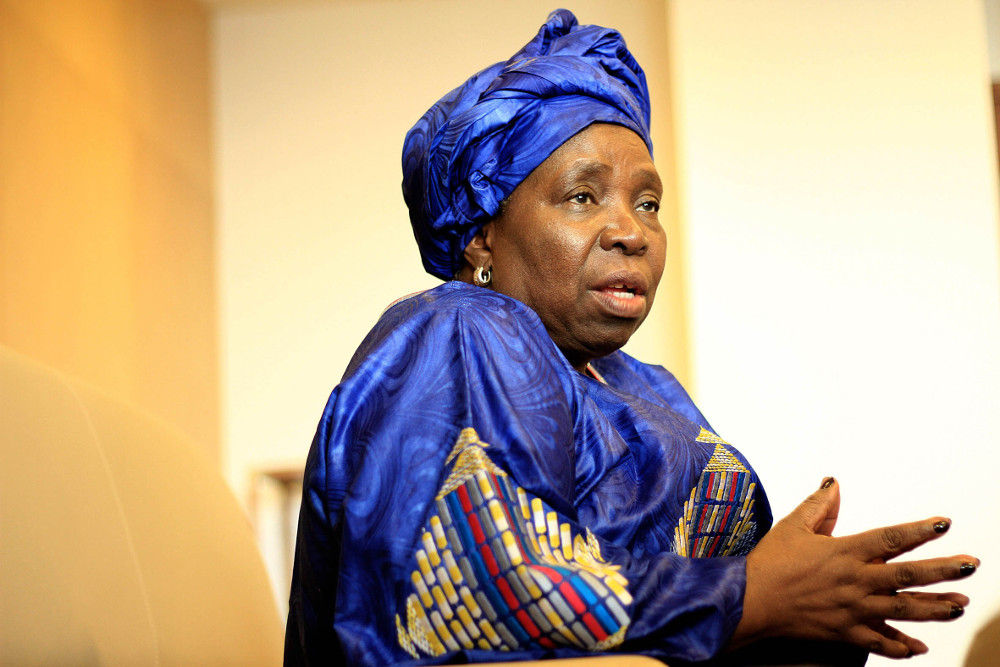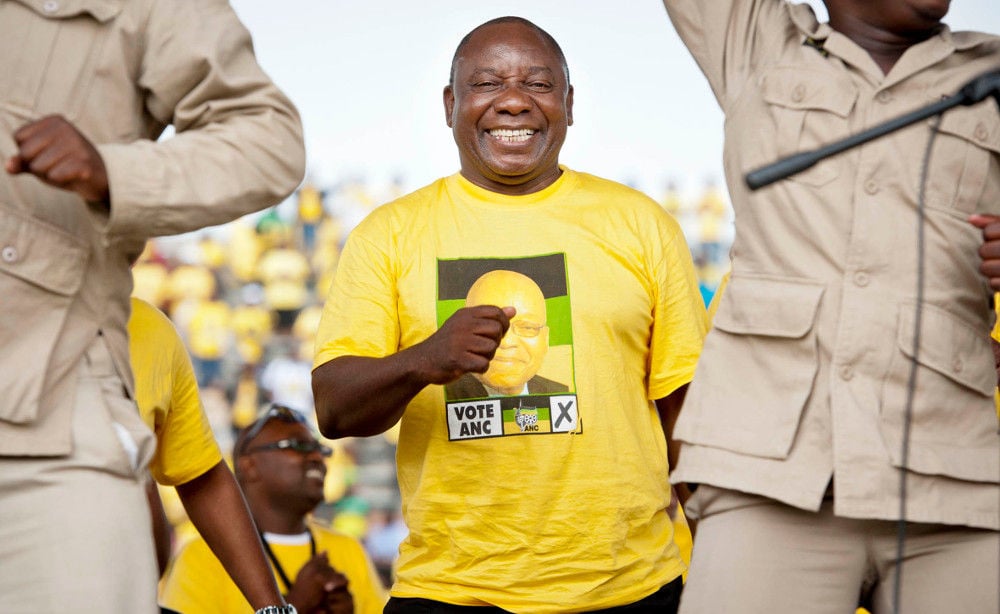New MPs are sworn in by Chief Justice Mogoeng Mogoeng.
Even as the National Assembly this week formally elected Jacob Zuma as president for the next five years, evidence mounted that his grip on power was already slipping, with his deputy Cyril Ramaphosa and party secretary general Gwede Mantashe expected to assert themselves.
A weaker performance from the ANC in the general elections was widely expected to be a headache for Zuma, who was the face of the party’s campaign. Even so, the open (if limited) defiance of Zuma, and the speed at which his control of important structures and decisions is eroding, came as a surprise.
And the result may well be that divisions are forming within the ANC more deeply and quickly than had been anticipated as Zuma, a seasoned survivor, fights back.
In appointing the Cabinet, Zuma has apparently made clear that there are six non-negotiable posts within the security and economic cluster that he wishes to make on his own, in terms of his presidential prerogative to appoint ministers and deputies. The economy and security are crucial posts to ensure control is not lost.
Insiders told the Mail & Guardian that Zuma would be satisfied with the rest of the posts being decided by the party and the alliance. However, the signs are there that Zuma is no longer as omnipotent as when he served his first term as the country’s president.
This week it emerged that:
- The ANC’s long-dormant deployment committee was not only back in business under Cyril Ramaphosa, but growing more influential in key appointments than under Zuma in the previous administration (see sidebar);
- ANC leaders in Gauteng wrestled back control of the premiership from the Zuma camp; and
- Other provinces, including the crucial KwaZulu-Natal and the Eastern Cape, defied the party’s national leadership in the process of appointing their premiers.
Zuma faces an ANC elective conference in 2017. Although he could theoretically seek a third term as the head of his party (the ANC does not have term limits for internal office), he is instead expected to push for a trusted candidate as his successor, such as national assembly speaker Baleka Mbete or his ex-wife Nkosazana Dlamini-Zuma. That would both help secure the remainder of his term as leader of the country and his influence beyond 2019.
At the ANC’s 2012 national conference, Zuma won an overwhelming internal victory, trouncing Kgalema Motlanthe and keeping other contenders from ever getting on to the ballot. However, early indications are that he has much work to do in the next three years if he is to repeat that performance.

Nkosazana Dlamini-Zuma, a possible successor to Zuma. (AFP)
Should he fail, his defeat will be at the hands of a coalition of the wounded with startling similarities to the one that won him the top job at the ANC’s national conference in Polokwane in 2007. As soon as Zuma appoints his Cabinet, those in the ANC’s NEC who have lost out will start to seek new alliances ahead of 2017.
Zuma also faces a national general council, a mid-term gathering between the five-yearly national conferences, next year, and then a crucial policy conference in June 2017. That policy conference has in the past been used as a proxy for leadership battles, with contenders signalling their intentions to various constituencies.
Mbeki replay
If events this week around the election of premiers is any indication, Zuma’s second term will be in part a replay of Thabo Mbeki’s second stint in office: characterised by reduced control on various fronts and defiance.
Several provinces are known to have been strongly encouraged to put forward female premier candidates to be announced this week. Instead, the Eastern Cape initially provided a list with just one candidate and Limpopo grumbled that it was no longer master of its own administration (after provincial departments were taken over by their national counterparts). KwaZulu-Natal demanded special consideration because it had only been under ANC control for 10 years. Mpumalanga argued that it had finally achieved stability under David Mabuza and Gauteng excluded Zuma’s preferred candidate from its list.
This came even as the national deployment committee, under Ramaphosa, reasserted its influence over the apportioning of top jobs in government and parastatals.
The deployment committee this week met a day before the national executive committee and identified a lack of female provincial leaders – all provincial party secretaries and chairpersons are men – in a clear contradiction of policy.
In his first five years Zuma is believed to have consulted widely on the appointment of people to posts as directors general or parastatal directors, giving outsiders – sometimes even people outside the ANC – influence, or the appearance of influence, over the departments and companies involved. Any reduction in Zuma’s say over such appointments will gear into a greater reduction of influence for those in his various kitchen cabinets, in turn reducing their incentive to support him.
Reverse effect
It is an effect that those in the inner circle have seen in reverse; proximity to Zuma and influence on his decisions depends on usefulness, sources close to the president say, and a lack of usefulness is a quick way to be left out in the cold. Even so, the effect could be subtle, especially at first. Insiders also say Zuma has a preference for keeping people close rather than alienating them.
In other cases, such as that of the South African Communist Party (SACP), things are more opaque. The SACP remains among the most fervent Zuma supporters in the ruling alliance, despite the fact that the Zuma administration has moved on few of the most critical issues the communists identified as reasons for why Mbeki should be recalled.
But his first five years in office also earned Zuma many enemies, not all of them yet declared.

Cyril Ramaphosa is seen as potential successor to Zuma. (Gallo)
The powerful National Union of Metalworkers of South Africa (Numsa) has declared itself willing to abandon both its umbrella organisation Cosatu and the ANC. Other unions, some unhappy about Zuma’s leadership and about the ANC throwing its full weight behind a National Development Plan they say is anti-worker, seeming intent on maintaining their relationship with the ANC, giving them a voting say in who will be the party’s next leader. And within the ANC, scattered through national and provincial leadership, are those who blame Zuma for everything from the rise of the Economic Freedom Fighters to being excluded from networks of patronage.
Other sources of disenchantment include the disintegration of the ANC Youth League under his watch, and his perceived influence in the split in Cosatu between factions backing either general secretary Zwelinzima Vavi or president Sdumo Dlamini.
Should Numsa succeed in establishing a viable workers’ party, Zuma – who entered the ANC presidency with promises of peace and unity –will have presided over the creation of two serious splinter groups, on top of the now increasingly irrelevant Congress of the People.
String of scandals
There are also those in the ANC concerned with the continuing string of scandals in which Zuma is personally implicated.
What the fledgling 2017 anti-Zuma camp lacks is a figure to rally behind, the equivalent of Zuma himself in the run-up to Polokwane.
Despite the hopes of some individuals that Ramaphosa could be such a figure, the ANC’s deputy president has provided no evidence by word or deed that he is considering a challenge.
Mantashe himself and former KZN premier and now ANC treasurer general Zweli Mkhize are also believed to have their eye on the crown and even former national police commissioner Bheki Cele is not without ambition.
Resurgent deployment committee starts calling the shots
The ANC first established a deployment committee in 1994, chaired by Walter Sisulu, to “advise on all matters of deployment”. Jacob Zuma, then the relatively uncontroversial deputy president of the party, took over as chair in 1999.
The idea, the party said, was to deploy cadres according to their skills and expertise, a nod to the need for a more technocratic approach subsequent to its first five years in power.
Whether the committee was ever highly influential is not clear, but by 2013 party insiders said it had in effect collapsed. Key appointments in government departments and parastatal entities were, they claimed, made by Zuma in consultation with outsiders such as his various “kitchen cabinets” or the Gupta family.
The committee is traditionally headed by the party’s deputy president, so when Cyril Ramaphosa was made chairperson of the committee in February 2013, the appointment was seen as a token gesture rather than one of true influence.
But that, it seems, is changing.
“It is not 100% functional, but there has been good progress,” said a pro-Zuma national ANC leader on the deployment committee this week. Efficient functioning alone is not enough, though. “We are not a technocratic organisation,” said the leader.
Another deployment committee member said the body is different under Ramaphosa’s leadership. “We meet more regularly now, more than before. But we don’t interfere with who is appointed minister or premier.
“One of the biggest achievements was our intervention to resolve the tensions between ministers and deputy ministers about roles. Often, you had a situation where ministers undermined their deputies. Not any more. We don’t appoint deputy ministers, but we can now give them clear roles,” the committee member said.
“We are now able to give a proper analysis on governance weaknesses. We have the right systems in place to do that. Ramaphosa’s experience in corporate governance has come in handy.
“Going forward, we are going to make sure we deploy capable cadres to ensure the ANC does not get embarrassed from time to time.”
Some leaders within the party interpret the burgeoning influence of the committee as a symptom rather than a cause of Zuma’s waning influence; in his first term in office, they say, he would have called the shots regardless.
Now, however, the national executive committee is more likely to listen to the committee’s recommendations – and it just so happens that it is being run by Ramaphosa and includes Gwede Mantashe in his capacity as secretary general, both of whom will be closely watched by the pro-Zuma camp as potential contenders for the top spot.
The hidden battle for Gauteng’s top post
It came right down to the wire, but ANC president Jacob Zuma’s top choice for the Gauteng premier never featured.
Shortly after midnight on Monday, the provincial leaders of the ANC in the country’s commercial hub burst out in applause. They had just been told that the party’s national executive committee had decided that Ntombi Mekgwe, previously Gauteng MEC for housing, should be the premier of Gauteng.
For a somewhat rebellious province, this represented a clear victory; Zuma, the man who had been publicly booed in and by Gauteng, was thought to have a clear preference for incumbent Nomvula Mokonyane. Some even say Zuma had promised to return Mokonyane to her post, despite the fact that provincial leaders in the party were bitterly opposed to her.
By choosing Mekgwe from the list of candidates provided by the provincial ANC (which did not include Mokonyane), the national body was at the very least signalling it would not go to war with Gauteng.
Then Mokonyane seemed to have a second chance. Mekgwe, insiders say, already congratulated on her appointment, waited until only the top five provincial officials remained in the room before breaking the news that she was not prepared to accept the position.
A flurry of early-hours calls followed, culminating in a meeting with the ANC’s top six. There, again, Mokonyane did not draw the endorsement, with the national executive committee instead endorsing David Makhura – also on the provincial list and considered no friend of Zuma – for the post.